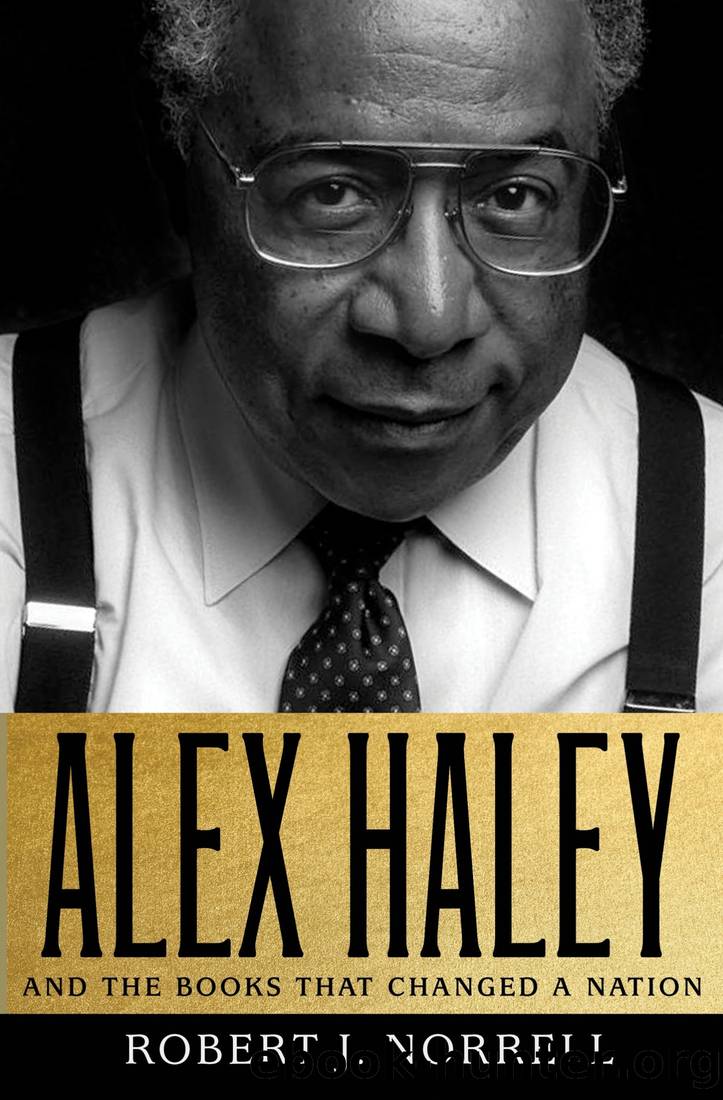Alex Haley: And the Books That Changed a Nation by Robert J. Norrell

Author:Robert J. Norrell [Norrell, Robert J.]
Language: eng
Format: epub
Tags: Biography & Autobiography, Literary Figures, social science, Ethnic Studies, American, African American & Black Studies
ISBN: 9781466879317
Google: mv5oCAAAQBAJ
Publisher: St. Martin's Publishing Group
Published: 2015-11-10T20:26:23.258908+00:00
8
The Black Family Bible
Lisa Drew handed Haley the copyedited manuscript of Roots on January 23, 1976. Promising to return it with the editorâs queries answered a week later, Haley left with the manuscript and settled into the Commodore Hotel in New York, where in the next two weeks he rewrote the last 183 pages. When he returned the manuscript, it was misplaced in the Doubleday building for a few days. The delay was long enough that the now frantic Lisa Drew did not let Haley see the galley proofs: âI was frankly frightened of risking having him rewrite any more at that point.â Doubleday was working to get the book out several months before the airing of the Roots television series, which, to great relief at Doubleday, was soon postponed until early 1977. This meant that that Haley could travel to promote the book in the fall of 1976.1
Though Roots was advertised as a book that covered seven generations of Haleyâs family, it turned out to be far more about slavery than it was about freedom. Over his long years of writing the book, Haleyâs dominant concern was establishing his African past. He saw that as his greatest contribution to black American history. The bookâs focus also reflected the disproportionate time he had spent on researching and writing about the African and Middle Passage experiences. By the time he got to writing about the family members born after Chicken Georgeâs timeâthe last four generationsâhe had to hammer out the remainder in about two months. The ending feels rushed, because the writing of it was rushed. Haley planned to dwell on his familyâs postâCivil War experience in a separate book.2
Haleyâs attachment to Kunta Kinte overwhelms his interest in other characters and dominates the book. He devoted years of research to creating an idyllic origin for his family in the unspoiled African environment. Kuntaâs mother, Binta, and father, Omoro, are perfect parentsâwell born, wise, and lovingâsymbols for the original natal family of every black American. Kunta is the African hero, fearless at every turn, until he chooses a peaceful life on the plantation over futile and probably fatal rebellion. He contradicts in every way the archetype of Sambo that Stanley Elkins had presented and that had gained so much attention in the 1960s.
Kunta was the second great hero Haley had created on the page. Kunta and Malcolm X both were examples of fierce, independent, and manly characters, and together they formed a new and cherished archetype for black Americansâand, indeed, for many whites. Haley grappled with issues of identity in writing about Malcolm and then Kunta, and the two may have been proxies, on a subconscious level, for the existential struggles of Haleyâs own life. The autobiographical impulse takes over Roots at the end, when Haley narrates his visit to Juffure.3
Though the book flows gracefully for at least the first half, Haley frequently tried to tell the reader too much. He relied on slavesâ speeches in dialect to narrate the history of race in American history.
Download
This site does not store any files on its server. We only index and link to content provided by other sites. Please contact the content providers to delete copyright contents if any and email us, we'll remove relevant links or contents immediately.
Spare by Prince Harry The Duke of Sussex(5174)
Machine Learning at Scale with H2O by Gregory Keys | David Whiting(4292)
Never by Ken Follett(3937)
Harry Potter and the Goblet Of Fire by J.K. Rowling(3848)
I Have Something to Say by John Bowe(3494)
Unfinished: A Memoir by Priyanka Chopra Jonas(3381)
Fairy Tale by Stephen King(3370)
Greenlights by Matthew McConaughey(3164)
The Man Who Died Twice by Richard Osman(3072)
Will by Will Smith(2907)
Think Again by Adam Grant(2458)
Rationality by Steven Pinker(2352)
It Starts With Us (It Ends with Us #2) by Colleen Hoover(2339)
Can't Hurt Me: Master Your Mind and Defy the Odds - Clean Edition by David Goggins(2323)
The Dark Hours by Michael Connelly(2300)
The Storyteller by Dave Grohl(2228)
Friends, Lovers, and the Big Terrible Thing by Matthew Perry(2219)
The Dawn of Everything: A New History of Humanity by David Graeber & David Wengrow(2191)
The Becoming by Nora Roberts(2188)
